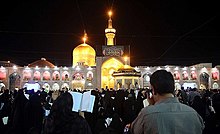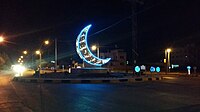Night of Power
| Laylat al-Qadr | |
|---|---|
| Official name | ليلة القدر (Night of Decree) |
| Also called | Night of Power, Night of Value, Night of Destiny, or Night of Determination[1] |
| Observed by | Muslims |
| Significance | Night the Quran was revealed; Angels descend to the earth and the annual decree is revealed to them; Better than 1000 months of worship |
| Observances | Night prayers, Reading Quran, Making Dua, Doing Dhikr, Observing Iʿtikāf |
| Date | See text |
| Part of a series on |
| Islamic culture |
|---|
| Architecture |
| Art |
| Clothing |
| Holidays |
| Literature |
| Music |
| Theatre |
Laylat al-Qadr (from Arabic: لیلة القدر), variously rendered in English as the Night of Decree[2], Night of Power,[3] Night of Value, Night of Destiny,[4] or Night of Measures, is in Islamic belief the night when the first verses of the Quran were revealed to the Islamic prophet Muhammad.[5] It is one of the nights of the last ten days of Ramadan. Muslims believe that on this night the blessings and mercy of God are abundant, sins are forgiven, supplications are accepted, and that the annual decree is revealed to the angels who also descend to earth, specially the Angel Gabriel, referred to as "the Spirit", to perform every and any errand decreed by God. Islam holds that God Almighty alone answers our supplications and that He alone receives them and forgives humanity and gives them what they ask for and that on this particular night Muslims should actively seek God's forgiveness and engage in various acts of worship.
Revelation to Prophet Muhammad
Some commentators believe that the Quran was revealed to Muhammad twice; the 'immediate revelation' happening on the Laylat al-Qadr and 'gradual revelation' across 23 years. The Quran uses the word Inzal (انزال) which justifies 'the immediate revelation', according to Allamah Tabatabai.[6] However some others believe that the revelation of Quran occurred in two phases, with the first phase being the revelation in its entirety on Laylat al-Qadr to the angel Gabriel (Jibril in Arabic) in the lowest heaven, and then the subsequent verse-by-verse revelation to Muhammad by Gabriel.[4] The revelation started in 610 CE at the Hira cave on Mount Nur in Mecca. The first Surah that was revealed was Sūrat al-ʿAlaq (in Arabic العلق). During the first revelation the first five verses of this Surah, or chapter, were revealed.[citation needed]
Date
The specific date of Laylat al-Qadr is not mentioned in the Quran.[7][8]
Sunni Islam
In Islamic countries and Sunni communities all over the world, Laylat al-Qadr is found to be on the last ten nights of Ramadan, mostly in on one of the odd nights (21st, 23rd, 25th, 27th or 29th) whereby night precedes day. Many traditions insist particularly on the night before the 27th of Ramadan.[9][10][11]
| 27th of Ramadan | Gregorian date[12] |
|---|---|
| 1438 | 22 June 2017 |
| 1439 | 11 June 2018 |
Shia Islam


Shia Muslims similarly believe that Laylat al-Qadr is to be found in the last ten odd nights of Ramadan but mostly on the 19th, 21st or 23rd of Ramadan with 23rd being the most important night.[13] The 19th, according to the Shia belief coincides with the night Ali was attacked in the Mihrab while worshipping in the Great Mosque of Kufa, and died on the 21st of Ramadan.
| 23rd of Ramadan | Gregorian date |
|---|---|
| 1436 | 10 July 2015 |
| 1437 | 27 June 2016[14] |
| 1438 | 18 June 2017[15] |
| 1439 | 8 June 2018[16] |
Mahdavi Muslims
Mahdavi Muslims believe that God blessed them with this most valued night of might/power, by the virtue of Muhammad Jaunpuri while travelling from Thatta (now in Pakistani province of Sindh) towards Farah (now in Afghanistan). During his stay in Makran, Imam Mahdi, in compliance with divine order, offered Dogana Laylat al-Qadr past midnight of 27 Ramadan 908 AH along with his family members and companions at the nearby mountain, which was later named after him as Koh-e-Murad.[17][18]
Religious importance
The night is not comparable to any others in view of Muslims[13] and according to a tradition, the blessings due to the acts of worship during this night can't be equaled even by worshipping throughout an entire lifetime. The reward of acts of worship done in this one single night is more than the reward of around 83 years (1000 months) of worship.[5] Laylat al-Qadr is referenced in the Quran:[4][13]
- We have indeed revealed this (Message) in the Night of Power:
- And what will explain to thee what the Night of Power is?
- The Night of Power is better than a thousand months.
- Therein come down the angels and the Spirit by Allah's permission, on every errand:
- Peace!... This until the rise of dawn!
The verses above regard the night as better than one thousand months.[13] The whole month of Ramadan is a period of spiritual training wherein believers devote much of their time to fasting, praying, reciting the Quran, engaging in the remembrance of God(dhikr) and giving charity.[citation needed] However, because of the revealed importance of this night, Muslims strive [give more effort] harder in the last ten days of Ramadan since the Laylat al-Qadr could be one of the odd-numbered days in these last ten (the first, third, fifth, seventh or ninth). Normally, some Muslims from each community perform iʿtikāf in the mosque: they remain in the mosque for the last ten days of the month for prayers and recitation.[4] Women also observe i'tikaf. They remain in prayer and meditation mostly, although they are allowed to do the minimum domestic work to run the family. When Muhammed observed i'tikaf in a tent, he saw a few tents around his. His wives joined him by pitching tents.[citation needed]
Shia Muslims believe that Ali (the first Shia Imam, and the fourth Caliph of the Rashidun Caliphate to Sunnis) had special insight and intimacy with Allah on this night. Imam Sadiq is quoted as saying (Tafsir “al-Burhan”, vol. 4, p. 487):
Once Imam Ali was reciting Surat al-Qadr and his sons, Imam Hasan (a) and Imam Husayn (a) were near him. Imam Husayn (a) asked his father: “Father, how come we feel a different sensation when you recite this surah?” Imam Ali(a) replied, “O son of the Prophet and my son! I know things from this chapter that you are not aware of now. When this surah was sent down to the Prophet he asked me to go to him. When I went to him he recited this surah, then he put his hand on my right shoulder and said: O my brother and my successor! O the leader of my nation after me! O tireless fighter with my enemies! This surah is yours after me, and is for your two sons after you. Gabriel who is my brother among the angels informs me of the events of one year of my nation at the night of Qadr. And after me he will give this information to you. This surah will always have a shining light in your heart and in the heart of your successors until the rising of the dawn of the day of reappearance of Qa'im [the one who rises, a title for the Islamic Messiah, Mahdi].”[20]
See also
References
- ^ Britannica Guide to the Islamic World. Encyclopaedia Britannica, Inc. 2009. ISBN 9781593398491. Retrieved 2 June 2017.
- ^ Halim, Fachrizal A. (2014). Legal Authority in Premodern Islam: Yahya B Sharaf Al-Nawawi in the Shafi'i School of Law. Routledge. p. 15. ISBN 9781317749189.
- ^ Daneshgar, Majid; Saleh, Walid (10 November 2016). Islamic Studies Today: Essays in Honor of Andrew Rippin. BRILL. ISBN 9789004337121.
- ^ a b c d A. Beverley, James (2011). Melton, J. Gordon (ed.). Religious Celebrations: An Encyclopedia of Holidays, Festivals, Solemn Observances, and Spiritual Commemorations [2 volumes]: An Encyclopedia of Holidays, Festivals, Solemn Observances, and Spiritual Commemorations. ABC-CLIO. ISBN 9781598842067. Retrieved 2 June 2017.
- ^ a b Halim, Fachrizal A. (20 November 2014). Legal Authority in Premodern Islam: Yahya B Sharaf Al-Nawawi in the Shafi'i School of Law. Routledge. ISBN 9781317749189. Retrieved 31 May 2017.
- ^ Staff. "Qadr night from the view point of Allamah Tabtabaei". Allamah Tabtabaei University. Archived from the original on 3 July 2016. Retrieved 12 June 2016.
- ^ Islam and state in Sumatra: a study of seventeenth-century Aceh. p.128.
- ^ Marjo Buitelaar. Fasting and feasting in Morocco: women's participation in ramzan. p.64
- ^ Night of 27 Ramadan
- ^ Mohammad Younes, Arefi. "The importance of Qadr night and the secret behind it's being hidden". The message of Woman (in farsi). Retrieved 12 June 2016.
{{cite journal}}: CS1 maint: unrecognized language (link) - ^ Parsa, Farvardin. "Laylat al-Qadr from the viewpoint of Sunni Muslims". Andisheh Club. Retrieved 12 June 2016.
- ^ http://www.calendarlabs.com/holidays/islam/laylat-al-kadr.php
- ^ a b c d Ysuf, Imtiyaz. "Laylat al-Qadr". The Oxford Encyclopedia of the Islamic World.
- ^ "Calendar center of Geophysics institute of Tehran University, 1395 Calendar" (PDF) (in Persian). Retrieved 12 June 2016.
- ^ "Calendar center of Geophysics institute of Tehran University, 1396 Calendar" (PDF) (in Persian). Retrieved 12 June 2016.
- ^ "Calendar center of Geophysics institute of Tehran University, 1397 Calendar" (PDF) (in Persian).
- ^ Koh e Murad
- ^ Dogana laytul qadr reference.
- ^ Quran 97:1–5
- ^ "Imam Mahdi (a) in Chapter al-Qadr". Al-Islam.org. Retrieved 23 June 2017.
External links
- Lailatul Qadr
- Al Qadr (The Night of Power And Fate)
- Laylatul Qadr: Introduction and guidance on special prayers for the night. (Includes Salaatul Tasbeeh)
- "Deliverance from Error on Knowledge of Times of Day and the Direction of Prayer" is an Arabic manuscript from 1683 which talks about the Night of Destiny

